Edie Melson's Blog, page 213
January 19, 2020
Developing a Winning Marketing Campaign: 3 True Accounts
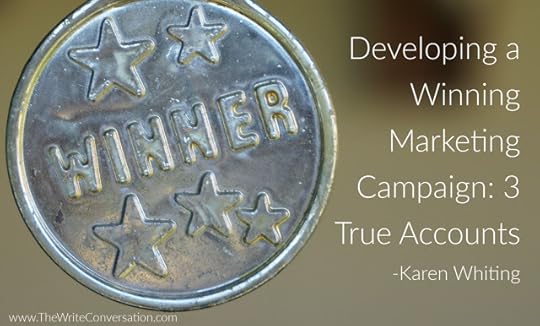
by Karen Whiting @KarenHWhiting
Christian Authors Network (CAN) awarded the first CAN Crown Marketing Gold Awards to three recipients, each in a different marketing category (visual, web, and broadcast marketing). I recently interviewed each to glean ideas on what makes a great marketing campaign with tips on improving your promotion efforts.
Adria started planning live events about four months before the release of her book The Joy Box Journal. She had attended marketing workshops at the Blue Ridge Christian Writers Conference and hired Monica Schmelter as a speaking and media coach.
Adria asked one of her favorite places, Chick-fil-A if they would hold a book launch. The manager spoke with the franchise owner and met with her within days. They had wanted to hold a Ladies Night for years out and thought this provided the perfect opportunity for the community. They wanted to include a few vendors. Adria brainstormed with the managers and they invited other small businesses to participate. She sold 200 copies at the event. Her own story and those she shares in the book touch people’s hearts and lives, so she sells well when at speaking venues.
Her live events garnered other speaking opportunities and helped her land TV appearances. She shares links on her website joyboxstories.com. She loves combining media appearances with events when she travels. She’s found locations willing to host her through posting on Facebook, contacting friends who live where she will be speaking, and searching online.
Adria started a weekly interview with people to share their stories of finding joy in hardships. She’s planning zoom events like a recipe exchange and sharing tips. As ever, she prays for God to guide her. She also carries her book with her at all times to be ready for any opportunity God shows her.
Lessons to Apply: Be courageous, approach businesses, and share your needs.
Campaign and the Little Blog that Went Viral (Web)
Carla Hoch, a martial arts specialist, served on a panel of writers at Realm Makers Writers Conference. Carla taught a class on fight scenes at the conference and then at her local fiction writing group. Carla then became a fight scene editor with an editing agency. She also started her blog Fightwrite.net. Soon she signed a book contract with Writer’s Digest for her book Fight Write. Her blog is blog #11 in the alphabetical WD list of Best Websites for Writers. Carla Her blog took off when Writer’s Digest (WD) featured Carla and her blog in their magazine and one post went viral with more than 20,000 hits. taught at the national WD conferences in Sacramento and New York city. She then started her popular Fight Write podcast.
To continue marketing, she promotes her blog and podcast. Friends and experts advised her and helped her with the technology to do a podcast and blog. She welcomes criticism as that improved her writing and speaking. To fuel the podcasts she reaches out to writers for questions and seeks out experts. She did a podcast of cleaning up a real crime scene after asking a local crime and trauma scene cleaning company.
Carla feels that she’s not good at marketing, but has God put her in the right places at the right times. Even as a contest winner, she accepted feedback from judges to change the look of her web site. The response to the new look has been great. She is revamping her blog into a website with instructional videos.
Apply Carla’s wisdom: Ask for help, learn from critiques, accept opportunities, and trust God.
Campaign Quiz that Grabbed Attention (Broadcast)
Dr. Saundra Dalton Smith started thinking about marketing as she wrote her book Sacred Rest She included a quiz in the book and then she used it on her website to for lead capture where readers receive weekly information from Saundra.
When the book didn’t take off as hoped, Saundra persisted with faith in her book and hired Hollywood Media Coaching and implemented a quiz on her web site she had planned to do. That landed her TV interviews including Daystar, Cornerstone TV, Marilyn Hickey Show, The Happy Hour Podcast with Jamie Ivey, God-Centered Mom Podcast, Atlanta Live, Moody Chicago. It worked best to always share the URL and to invite people to take the free quiz. Her email list from that grew to 25,000. Media appearances led to speaking invitations with TEDxAtlanta inviting Dr. Dalton-Smith to be the opening speaker at their 2019 event and speaking at the 2020 World Happiness Summit. She also developed a podcast that is now supported by sponsors.
Also never stopping the marketing. Do things as you think of them. Saundra bought her website Restquiz.com name as soon as she had the idea before she created the actual quiz. Saundra now pitches media specific niches to focus on problems members face, learn more about reaching her audience on social media, and writes articles.
Lessons to Apply: Be persistent and keep building the platform! Invest in a pro if you need help.
Each winner had a starting point and built the marketing around it. Each one persists, studies marketing, seeks help, and continues to work at marketing, especially in what they consider their sweet spot.
TWEETABLEDeveloping a Winning Marketing Campaign: 3 True Accounts - @KarenHWhiting on @EdieMelson (Click to Tweet)
 Karen Whiting (www.karenwhiting.com) is an international speaker, former television host of Puppets on Parade, certified writing and marketing coach, and award-winning author of twenty-six books for women, children, and families. Her newest book, 52 Weekly Devotions for Families Called to Serve, uses stories, activities, and chat prompts to help families develop servant hearts and foster strong bonds in families who have members serving the community, nation, or world.
Karen Whiting (www.karenwhiting.com) is an international speaker, former television host of Puppets on Parade, certified writing and marketing coach, and award-winning author of twenty-six books for women, children, and families. Her newest book, 52 Weekly Devotions for Families Called to Serve, uses stories, activities, and chat prompts to help families develop servant hearts and foster strong bonds in families who have members serving the community, nation, or world.She has a heart to grow tomorrow’s wholesome families today. She has written more than seven hundred articles for more than sixty publications and loves to let creativity splash over the pages of what she writes. She writes for Leading Hearts and Crosswalk.com. Connect with Karen on Twitter @KarenHWhiting, Pinterest KarenWhiting, and FB KarenHWhiting
Published on January 19, 2020 22:00
January 18, 2020
New Year, New Time, New Writing You

by Tammy Karasek @TickledPinkTam
“There is a time for everything, and a season for every activity under heaven…”Ecclesiastes 3:1 (NIV)
I think of this verse every January as we begin a new year. A friend read this passage at my father’s funeral in January 1994. Though it was a sad day, this encouraged me that this was a season in my life, and changes would come.
When I flip the calendar to January, I am reminded that it’s a time for all things new, a season of change, and maybe resolutions or goal setting. I look forward to the great new things that will happen in the coming year. Setting goals and writing them down in my planner makes me giddy. Adding fun events make me smile. Marking deadlines for projects inspire me to stay on track All of us can set personal goals to make our writing more productive, to be kind and helpful to our fellow writers and to show more Jesus in all that we write. But do we strive to achieve those goals? Or like that new gym membership, they become forgotten before February’s calendar page is turned.
It’s up to each of us to make that choice. Will you set a goal this year to apply yourself more to your writing? Will you resolve to be on time at your desk and ready to do what is needed that day? Will you look for ways to engage with your fellow writers in a thoughtful and encouraging way?
I’d mulled these specific thoughts for myself regarding my writing this year and written down a few goals. Then I read a scripture passage one morning, and found a new verse that has had me talking about it as well as committing it to my writing goals for twenty-twenty.
“He who was seated on the throne said, ‘I am making everything new!’ Then he said, ‘Write this down, for these words are trustworthy and true.”Revelations 21:5 NIV
I realize this passage is referring to the New Jerusalem, but it struck me that He is making everything new for me as well in this coming year regarding my writing journey. There are many changes on the horizon for me in my writing path. Some good, some—just will be. Maybe there will be changes for you as well. But this passage gave me extra wind in my sails, so to speak. I was greatly encouraged and grabbed it for myself and did as it said—I wrote it down as words that are trustworthy and true since they are from God.
Will this be your year for the gospel to shine brightly through your written words for others to see Him? Will you encourage your fellow writers to do the same? I pray you write it down that the Lord is making all things new and you resolve to grab this season for your writing and give it your best.
There really is a time for everything and He will make new things for us all the time.
TWEETABLENew Year, New Time, New Writing You - @TicledPinkTam on @EdieMelson (Click to Tweet)
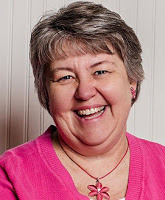 You’ll find Tammy seeing humor and causing laughter in every aspect of life. Her past, filled with bullying and criticism from family, is the driving force of her passion to always encourage others and give them The Reason to smile. She’s been married to her college sweetheart, Larry, for 37 years, a mom to their grown daughter, Kristen, and wrapped around the paw of a little dog named Hattie. Born and raised in Ohio, her family now resides in South Carolina. She is the President of Word Weavers Upstate SC, member of ACFW and My Book Therapy/Novel Academy. She’s the Blog Editor for Word Weavers International. A Conference Assistant for Blue Ridge Christian Writers Conference. A monthly contributor for The Write Conversation. A contributor in the 2018 Divine Moments Compilation Book—Cool-inary Moments. Also a regular contributor to several other blogs.
You’ll find Tammy seeing humor and causing laughter in every aspect of life. Her past, filled with bullying and criticism from family, is the driving force of her passion to always encourage others and give them The Reason to smile. She’s been married to her college sweetheart, Larry, for 37 years, a mom to their grown daughter, Kristen, and wrapped around the paw of a little dog named Hattie. Born and raised in Ohio, her family now resides in South Carolina. She is the President of Word Weavers Upstate SC, member of ACFW and My Book Therapy/Novel Academy. She’s the Blog Editor for Word Weavers International. A Conference Assistant for Blue Ridge Christian Writers Conference. A monthly contributor for The Write Conversation. A contributor in the 2018 Divine Moments Compilation Book—Cool-inary Moments. Also a regular contributor to several other blogs. Connect with Tammy: Blog: http://www.tammykarasek.com Email: tickledpinktammy@gmail.com
Published on January 18, 2020 22:00
January 17, 2020
Dear Frightened Writer—6 Things to Remember When Fear Overwhelms
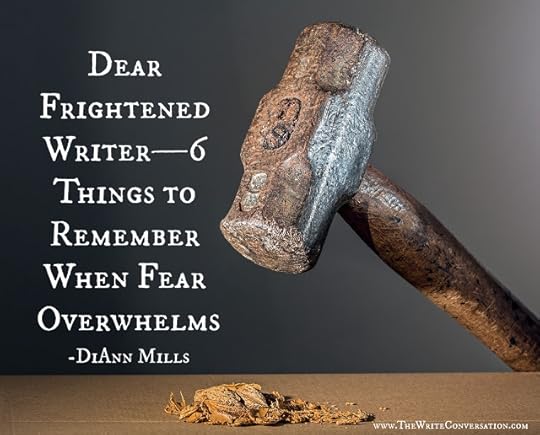
by DiAnn Mills @DiAnnMills
It’s January 2020, and we have decided this is the year to write, to begin the project that has stalked us for weeks, months, and maybe years. We’ve dreamed about putting thoughts into words for so long, and now it’s become our go-to past-time. Our hearts ache with the passion to create words that move into sentences, paragraphs, pages, chapters, and even a book. The thought nips at our waking and sleeping hours until we must at least try.But we’re afraid. Beginning means setting out on a journey of the unknown. We writers must rip the scars from their hearts to bleed life experiences onto paper. What if we fail? What if the longing is just a disguise for refusing to believe our goals are impossible … an achievement for others but not us?
How do we ever know if an endeavor is worth the price unless we choose to chase the outrageous and risk defeat? Our nights have been sleepless thinking about the desire to write and content, so why not crawl out of bed and string together the words consuming us?
The publishing world can be a scary place. Sometimes we writers feel like a tiny fish in a huge pond. We forget every big fish started small. We all have to grow our skills, our brands, and our self-confidence to succeed in reaching dreams and goals.
What if we take a leap of faith into the vast world of dreams? What might happen? How can we frightened writers take the first step, master it, and move on to the next?
Below are 6 ways to brace ourselves for the journey ahead.1. Embrace the decision to be a writer. The gift is a calling. Don’t take the magnificence lightly.2. Choose to learn the craft. Allot time every day to study the how-to books. Research online learning and choose what blogs, podcasts, and webinars fill our needs. Invest in a highly respected writers conferences. 3. Place readers above ourselves. We write to address their needs. Discover those who crave what we have to offer.4. Prepare to engage social media with a plan to work smart. Incorporate a minimum amount of time to produce the maximum impact.5. Vow to never stop reading and studying every aspect of the publishing industry.6. Share what we learn with a serious writer. Pay the craft forward.
Dear writer, being frightened is useful only if it helps us survive a potential tragedy. When we worry and express our fear about the future, we diminish the power of God. Trust God for the outcome of your writing and do your best work with Him.
What writing fears chase you?
TWEETABLEDear Frightened Writer—6 Things to Remember When Fear Overwhelms - @DiAnnMills on @EdieMelson (Click to Tweet)
 DiAnn Mills is a bestselling author who believes her readers should expect an adventure. She creates action-packed, suspense-filled novels to thrill readers. Her titles have appeared on the CBA and ECPA bestseller lists; won two Christy Awards; and been finalists for the RITA, Daphne Du Maurier, Inspirational Readers’ Choice, and Carol award contests.
DiAnn Mills is a bestselling author who believes her readers should expect an adventure. She creates action-packed, suspense-filled novels to thrill readers. Her titles have appeared on the CBA and ECPA bestseller lists; won two Christy Awards; and been finalists for the RITA, Daphne Du Maurier, Inspirational Readers’ Choice, and Carol award contests. She is the director of the Blue Ridge Mountain Christian Writers Conference, Mountainside Marketing Retreat, and Mountainside Novelist Retreat with social media specialist Edie Melson. Connect here: DiAnnMills.com
Published on January 17, 2020 22:00
January 16, 2020
Do I Really Need a Writers Group?

by Edie Melson @EdieMelson
I field a lot of questions about the value of having a critique group and/or partner. There are as many answers as there are writers. But there are very few who are able to produce publishable writing in a vacuum.
For me personally, I wouldn’t be where I am today as a writer if it weren't for the groups who have nurtured me along the way.
Although we tend to think of writing as a primarily solitary pursuit, writing for publication is an endeavor built on forging relationships. And those relationships can ultimately determine our success or failure in the writing industry. Here’s a list of those relationships.Between you and other writersBetween you and the readerBetween the reader and the subject or charactersBetween you and the editorBetween you and your agentI listed the relationship between writers first, because surprisingly, those are often the most vital in our writing life. The actual act of putting words on paper is a solitary act and because of that it’s easy to lose perspective.
Writing in a vacuum can give us a false sense of whether or not we’re effective in our endeavor. We either wind up thinking we’re a genius or sink into the depths of despair because we can’t string two coherent sentences together. Rarely is either perspective accurate.
We need others in our profession to give us feedback, keep us grounded and provide encouragement. You may be tempted, like I was at first, to insert friends and family into this role. Unless they’re also writers this dynamic just doesn’t work. They’ll unwittingly encourage you when you need a swift kick in the pants and administer the kick in the pants when you need encouragement.
That’s where a writers group, critique group or critique partner will help. But you have to be careful—some critique and writers groups can be toxic. I’ve visited some where the purpose appears to be to build up the one delivering the critique by tearing down the hapless author. You want to avoid these groups at all cost.
Here’s a list of what to look for in a group or a partnerAn encouraging atmosphere –not all sweetness and light—nobody improves on false compliments. But I’ve almost never found a manuscript that didn’t have some redeeming quality.A mutually beneficial relationship. You should both bring something valuable if it’s a partnership—you may excel at writing dialogue and your partner is a whiz at description.A hunger to improve. If it’s a group there should be a movement toward growth in the majority of members. Even if you’re all beginners, if you’re all reading writing books and attending classes you’ll be able to grow and learn together.A timekeeper. If someone’s not willing to keep track of the time not everyone will get a chance to be critiqued. It’s a dirty job, but someone’s got to do it!So now here’s your chance—what experiences have you had with writing groups and partnerships? Be sure to share your thoughts in the comments section below.
Don’t forget to join the conversation!Blessings,Edie
TWEETABLEDo I Really Need a Writers Group? - @EdieMelson (Click to Tweet)
Published on January 16, 2020 22:00
January 15, 2020
11 Lessons Learned Along the Blogging Road
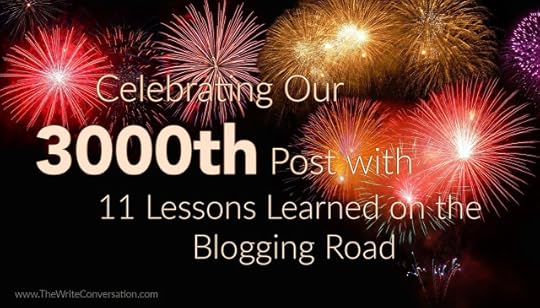
by Edie Melson @EdieMelson
Can you believe it? Today we hit the 3000th blog post today on The Write Conversation.
Yeah, me too.
I wrote that number and then had to stop and let the reality sink in.
I had no idea what God had planned when I began this tiny blog 11 years ago.There have been some detours and dips in the road, but it's been an amazing journey and I can't wait to see what the next 11 years bring! To celebrate, I thought I'd share a little of what I've learned.
11 Lessons Learned Along the Blogging Road
1. Blogging isn’t about what I have to say, it’s about what my readers want to hear. The difference is subtle, but the focus is ALWAYS on our readers, not us.2. Blogging is a marathon, not a sprint. We need to have realistic expectations, not wild delusions of instant visibility. 3. There’s more to blogging than just writing. We must know how to craft a compelling title, format for reading on a screen, learn about keywords and even the basics of SEO. There’s an entire skill-set that must be learned to be a successful blogger.4. Blogging has value. Sometimes I’ve written a post and wonder what was the point. The numbers were low and so were the comments. Inevitably that was the post someone mentioned when they shared how God used this site to impact them. 5. Blogging is work. In essence starting a blog is like opening a business. We may be passionate about it, but to make it successful we have to be willing to work and put in the necessary hours.6. Running a blog is about building a community. For a blog to have an impact, it must have readers—returning readers. That means building a community of people who gather together regularly. 7. Blogging requires a commitment to excellence. We must be willing to take the time to make certain what we present reaches a certain standard. That means editing, taking time choose images that make sense, and following a process.8. Blogging is about interacting. We must always be mindful of those who comment on our blogs. If they took the time to write a comment, we can at least enter the conversation.9. An unfocused blog is an unread blog. No matter how compelling the content of a site, if it can’t be found through a search engine, it won’t be read. Sticking to a single category allows search engines the opportunity to become familiar with our content and move it up in the search ranking.10. Change is inevitable. The world around us changes, our circumstances change, even our focus changes. My blog is much different today than it was when I started—and so is my vision of what I want it to be. A successful blogger is one that is willing to embrace11. Blogging is a chance to make a difference. At no other time in history have writers had the opportunity to impact the world for good without the barrier of physical location or distribution. We are called for such a time as this and we must be willing to step up and let God use us to make that difference.
These are things I've learned over the years. I'd love to know what you'd add to the list. Be sure to leave your thoughts in the comments section below!
Don't forget to join the conversation!
Blessings,
Edie
TWEETABLE11 Lessons Learned Along the Blogging Road - @EdieMelson (Click to Tweet)
Published on January 15, 2020 22:00
January 14, 2020
When Your Writing Needs Some CPR

by Katy Kauffman @KatyKauffman28
Lifeless words, crushing deadlines, and writer’s block. This triple threat can threaten our creativity and stifle inspiration. Our highest aspiration as nonfiction writers includes capturing a message on paper that imparts truth, grace, and power to our readers. But when we grow weary of getting the words just right, conquering our deadlines, and smashing writer’s block, the goal becomes writing something on the page. Sometimes that’s all we can do until a fresh breeze of wisdom (and divine intervention) breathes life into our writing.
C – Create a lead-in that captures the reader’s interest, and weave your story or slant all the way through your writing.
A story draws the reader in, and allows them to “see” your point. Pick a story that perfectly illustrates your main idea, and share more of the story in the conclusion or repeat a part of it that builds to a climatic finish.
If you’re using a metaphor as your slant, weave it into several parts of your writing. Use it as the lead-in to gain interest. Explain its spiritual significance as you begin to talk about Scripture. Repeat it in your ending takeaway. The metaphor reinforces your point and ties your paragraphs together.
My favorite metaphor tends to be music or dancing. (The good kind.) I have contrasted guilt and forgiveness by using music as a slant. “The haunting melody of guilt had followed her, had crept into her soul. But she heard Jesus sing a different song, one of mercy and forgiveness.”1 This contrast became the slant for talking about the woman with the alabaster flask in Luke Chapter 7, a story I have always treasured.
P – Present not only the what of your point, but include the why and/or the how.
Many writers stop with the what. It’s essential, but it’s not the whole story. Too often “factual” causes an article to be rejected or a book proposal to end up in the slush pile. Connect the facts to what intrigues the mind and touches the heart.
To inspire readers to take action, show them why they need to take action and how to do what you’re discussing. Use Scripture and life experience to show them why they need to take your message to heart. Give them practical steps they can start implementing immediately.
For example, in Breaking the Chains, Laura W. Watts contributed an article titled “Fight Indifference with a Flame of Love.” She not only identified eight symptoms of indifference, showing why it was so dangerous, but she gave six ways to break free from it.
R – Replace limp words with vivid ones, and cut unnecessary words, sentences, and paragraphs.
I’ve learned that editing is not an assault on me personally. A cut to my words isn’t a cut on my identity or value. Editing is needed. Essential. It’s a must for anyone who bears the name writer.
A good practice is to look at every word in a sentence and see if it’s vivid and necessary. Exchange limp words with nouns and verbs that illustrate, that paint a picture in the reader’s mind. Cut the words and sentences that aren’t needed. Analyze the purpose of whole paragraphs, and see if they fit nicely into your flow of thought. Streamlined writing makes for streamlined and enjoyable reading.
My heart has ached when I’ve copied and pasted whole paragraphs into a “Deleted” file. But I knew I could visit them again if I found a home for them. The reader will never know what we have changed or cut in our writing. However, they will receive the best possible version if we faithfully infuse our writing with words that sing, touch the heart, and follow our flow of thought.
Which step in the CPR method do you practice regularly? Which one do you need? Tell us in the comments, and may 2020 be a banner year for writing with vitality and impact.
TWEETABLEWhen Your Writing Needs Come CPR - @KatyKauffman28 on @EdieMelson (Click to Tweet)
1 Katy Kauffman, compiler and author, Breaking the Chains: Strategies for Overcoming Spiritual Bondage (Buford, Georgia: Lighthouse Bible Studies, 2017), 13.
 Katy Kauffman is an award-winning author, an editor of Refresh Bible Study Magazine, and a co-founder of Lighthouse Bible Studies. She loves connecting with writers and working alongside them in compilations, such as Heart Renovation: A Construction Guide to Godly Character, which was a 2019 Selah Awards finalist and Director’s Choice finalist. She is planning a sequel to another Selah finalist, Breaking the Chains (2017), titled Sustaining Life’s Victories.
Katy Kauffman is an award-winning author, an editor of Refresh Bible Study Magazine, and a co-founder of Lighthouse Bible Studies. She loves connecting with writers and working alongside them in compilations, such as Heart Renovation: A Construction Guide to Godly Character, which was a 2019 Selah Awards finalist and Director’s Choice finalist. She is planning a sequel to another Selah finalist, Breaking the Chains (2017), titled Sustaining Life’s Victories.Katy’s writing can be found at CBN.com, thoughts-about-God.com, the Arise Daily blog, and two blogs on writing. She loves spending time with family and friends, making jewelry, and hunting for the best donuts. Connect with her at her blog, The Scrapbooked Bible Study, and on Facebook and Twitter.
Published on January 14, 2020 22:00
January 13, 2020
Rejections – The Fuel to Writing Success
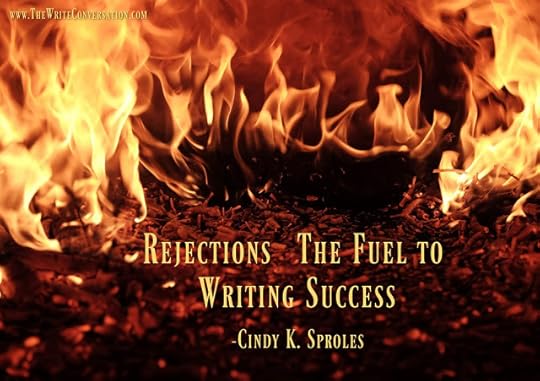
by Cindy K. Sproles @CindyDevoted
I spent some quality time with a new writer. She’d gotten her first rejection letter from a publisher and as hard as it was for her to put on a brave face, I could see how the rejection hurt.
It happens to us all. Frustration sets in, a sense of unworthiness. Perhaps I’m not as good as I thought reels through our minds. All the roots of “failure” sink into fertile grounds of our minds making the perfect situation to believe a lie.“Maybe I just need to skip the writing part and just be a speaker.” She said.
“Uh, no! This is a stepping stone, so step.”
Rejection, whether as a writer or any other place marker in our life, stills stings. I’ve had my share. It can turn our lives and our hearts inside out. I could hear the sense of loss and disappointment in this writer’s voice. And I couldn’t fix it.
The first rule of thumb when facing rejection is never give up. You don’t stop working to improve just because one said no. That’s not a free card to quit. No sir. Let the words of rejection fuel your success. Allow those words to be what spurs you ahead to make necessary changes and improvements.
When I failed as a teen, I remember Mom sharing her pickle comparison. How do pickles compare to writing rejections? Stick with me.
“Anything worth doing takes time and practice. It’s never perfect every time. I’ve followed the recipe to the exact step and still had my pickles ruin. My point is, making pickles takes practice. The sooner you learn that about your failures, the better a person you will become.” Mom was wise. In fact, at 93 she still throws that comparison at me and she’s still right.
I’ve stood over the kitchen counter slicing cucumbers until my fingers were numb. I’ve poked pint jars full of long slices of juicy cucumbers then anticipated the sweet taste to come. But pickles don’t become pickles overnight. It’s a long process, and just like life, it takes time to “make”.
There are steps to making nice, crunchy pickles. Learning to hone the process and wait for the result, takes time. Should we miss a step or fudge (which, by the way is something else that is a process), then our pickles fail.
I’ve watched my mother throw out cans of pickles because they spoiled instead of pickling. She’d grow frustrated and wonder if she’d lost her skill – then out would come the recipe where she’d pour over each step, locating what she did wrong or better yet, what she could do better. The process for successful pickles, required Mom backtracking and evaluating her steps. It wasn’t long before she’d make improvements. It was like a light came on and she became determined to succeed. When the next batch was ready, the brine was poured over the cucumbers, and cans sealed and placed on a shelf “to make,” Mom was ready for success. And how sweet the taste of success is when the pickles are right.
Forrest Gump coined an infamous phrase. “Life is like a box of chocolates,” but I say, Life is like making pickles. It sometimes requires a do over. Success takes practice and honing. Waiting is a valuable part of the process. We must wait for the words to “make,” then when we can pop the seal on the jar and pull out a nice crunchy pickle (i.e. story). Now it’s a moment to savor.
When rejection or failed attempts plague you, pull out the recipe and hone the work. Allow your rejections to fuel the determination to become a better writer. The next batch may just be the perfect pickle.
TWEETABLE
Rejections – The Fuel to Writing Success - @CindyDevoted on @EdieMelson (Click to Tweet)
 Cindy K. Sproles is an author, speaker, and conference teacher. She is the cofounder of ChristianDevotions.us and the executive editor of ChristianDevotions.us and InspireaFire.com. Cindy is the managing editor for Straight Street Books and SonRise Devotionals, both imprints of Lighthouse Publishing of the Carolinas. She is an award-winning and best-selling author and the director of the Asheville Christian Writers Conference. Visit Cindy at
www.cindysproles.com
. @cindydevoted
Cindy K. Sproles is an author, speaker, and conference teacher. She is the cofounder of ChristianDevotions.us and the executive editor of ChristianDevotions.us and InspireaFire.com. Cindy is the managing editor for Straight Street Books and SonRise Devotionals, both imprints of Lighthouse Publishing of the Carolinas. She is an award-winning and best-selling author and the director of the Asheville Christian Writers Conference. Visit Cindy at
www.cindysproles.com
. @cindydevoted
Published on January 13, 2020 22:00
January 12, 2020
How Writers Can Craft an Ending for Their Presentation
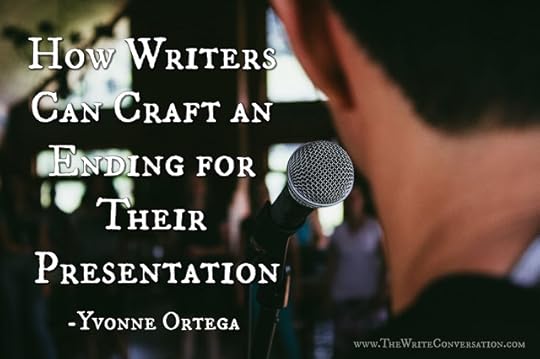
by Yvonne Ortega @YvonneOrtega1
You’ve crafted an introduction and the body or main points of your presentation. How can you conclude your speaking engagement?The First Part of the ConclusionUse a phrase to let your audience know that you will soon conclude. Some speakers say, “In conclusion . . .” or “In summary . . .” Others say, “To wrap up . . .” You can vary which one you use.
I like to say, “Before I wrap up, we will have ‘Q&A’ (Question & Answer Time).” The amount of time the event planner has given me to speak determines the length of the Q-A. I prefer five to ten minutes on a breakout session of forty-five to fifty minutes and fifteen to twenty minutes for an all-day event. If the event planner tells me how much time to allow for the Q-A, I plan my presentation to comply. When we comply, we increase our chances of being asked to return.
You’ve probably seen speakers end with the Q&A. I prefer to conduct that part of my conclusion before I review the main points of my presentation. You may want to do the same. That method prevents a participant from monopolizing the Q-A with one question or comment after another. After all, you want to be fair and give the others a chance to ask a question.
At a high school speaking engagement, I had a young man try to take over. I smiled and said, “Thank you for sharing. We need to move on and give the others a chance to ask a question.”
The Second Part of the ConclusionThis is a summary of the main points. You can review the points yourself, or you can ask the audience for the points.
When I spoke on anger at a co-ed event, I said the first two points and couldn’t remember the third one. I laughed and admitted, “I’ve gone blank.” The audience also laughed and said the third point for me. You can also ask them for all of the points.
The Third Part of the Conclusion For speakers, this is the “call back.” When you have a story in the introduction or for each point, you can call back to one of them in the conclusion. If you are one of several speakers, you can call back to one of their stories, to a humorous or positive statement they made, or to their career. Do that only if it fits your presentation.
At a conference where I spoke on life challenges and transitions, Laura, the speaker before me, was a lawyer. I said, “My ex-husband apparently didn’t like the local judge’s decision and filed a state appeal. That moved the case to the federal district court.” I paused and said, “Where was Laura when I needed her?” The audience laughed.
The Fourth Part of the Conclusion This is a challenge or call to action (CTA) based on your presentation. Regardless of their reasons for attendance: pressure from a boss or spouse or their own motivation, you give the audience a challenge or a call to action.
When I spoke on breast cancer, I said, “If it’s been more than a year since your last mammogram, what day this week will you call to schedule one?During a women’s retreat on grief I said, “If you don’t move forward, what will your life be like one year from now? Five years from now, if you’re still alive?”
In summary, the four steps to craft a conclusion are:A phrase to signal the conclusionA summary of the main pointsA “call back”A challenge or call to action (CTA)TWEETABLEHow Writers Can Craft an Ending for Their Presentation - @YvonneOrtega1 on @EdieMelson (Click to Tweet)
 Yvonne Ortega walks with a small footprint but leaves a giant imprint in people’s lives. This power-packed package is a professional speaker and the author of the Moving from Broken to Beautiful® Series through cancer, divorce, forgiveness, and loss. Learn more at www.YvonneOrtega.com
Yvonne Ortega walks with a small footprint but leaves a giant imprint in people’s lives. This power-packed package is a professional speaker and the author of the Moving from Broken to Beautiful® Series through cancer, divorce, forgiveness, and loss. Learn more at www.YvonneOrtega.comYvonne speaks with honesty and humor as she shares her life and struggles through presentations that empower women to find peace, power, and purpose through God’s Word.
Yvonne’s background as a licensed professional counselor brings a unique perspective into the heart of women. She’s a speaking and writing coach and the owner of Moving from Broken to Beautiful®, LLC. She belongs to the Advanced Writers and Speakers Association, the Christian Authors Network, the National Speakers Association, and Toastmasters International.
She celebrates life at the beach, where she walks, builds sand castles, blows bubbles, and dances.
Published on January 12, 2020 22:00
January 11, 2020
What's Your POV as a Writer?
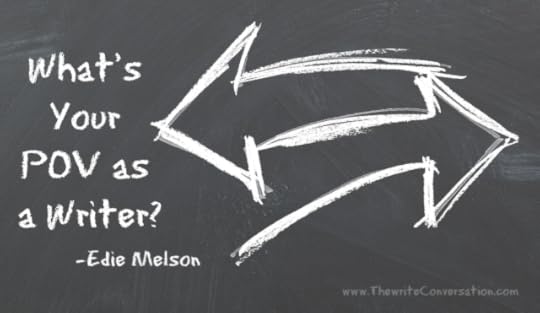
by Edie Melson @EdieMelson
My friends, I don’t feel that I have already arrived. But I forget what is behind, and I struggle for what is ahead. I run toward the goal, so that I can win the prize of being called to heaven. This is the prize that God offers because of what Christ Jesus has done. Philippians 3:13-14
Publishing is a tough business.
It’s almost impossible to write anything for public consumption without feeling like you’re throwing your heart into the lion’s den. And I don’t know about you, but I give these negative comments a lot more credibility than the positive ones. The good ones I tend to disregard with the thought that the person commenting was, “just being nice.”
With the mind-set of letting our POV (Point of View) focus on past rejections it’s possible to shrivel up and die, at least as a writer. Feeding ourselves on what’s gone before forces us to a standstill.
And it comes with an entire travel trailer full of baggage.
It’s easy to become overwhelmed with doubt, insecurity and an almost overwhelming urge to give up. Instead, draw a line in the sand. Commit today, RIGHT NOW, to begin to live in the future, on the promises God has given you.
If you’re writing now, you know the promise I’m talking about. You’ve heard that still, small voice call your name. You’ve gotten that confirmation you’ve asked for. Now it’s time to move forward, believing God truly is big enough to make it happen. He doesn’t call us out, fully formed and ready. He calls us out when we’re weak—ready for Him to equip us.
TWEETABLE
What's Your POV as a Writer? @EdieMelson (Click to Tweet)
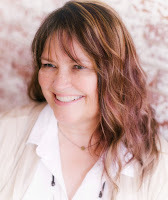 Edie Melson is a woman of faith with ink-stained fingers observing life through the lens of her camera. No matter whether she’s talking to writers, entrepreneurs, or readers, her first advice is always “Find your voice, live your story.” As an author, blogger, and speaker she’s encouraged and challenged audiences across the country and around the world. Her numerous books reflect her passion to help others develop the strength of their God-given gifts and apply them to their lives. Connect with her on her website, through Facebook, Twitter and Instagram.
Edie Melson is a woman of faith with ink-stained fingers observing life through the lens of her camera. No matter whether she’s talking to writers, entrepreneurs, or readers, her first advice is always “Find your voice, live your story.” As an author, blogger, and speaker she’s encouraged and challenged audiences across the country and around the world. Her numerous books reflect her passion to help others develop the strength of their God-given gifts and apply them to their lives. Connect with her on her website, through Facebook, Twitter and Instagram.
Published on January 11, 2020 22:00
January 10, 2020
Writers, Sometimes We Just Need to Admit We Can’t Do It All
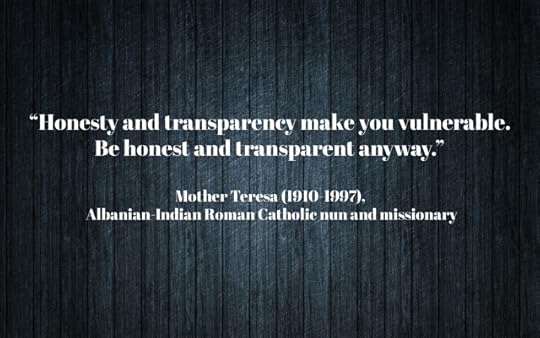
by Beth K. Vogt @BethVogt
I started off the New Year by canceling a speaking engagement for a local writers group three days before it was scheduled to occur.
Not exactly what I had planned to do.But I also hadn’t expected one of my daughters to end up in the hospital.
Or that my husband and I would be caring for our two young granddaughters.
That there would be several sleepless nights.
That instead of quickly recovering from a surgical procedure, my daughter would encounter setbacks.
During all of this unexpectedness, I continued to finalize my workshop. Perfecting the PowerPoint slides. Gathering items for attendees.
The show was going to go on – pardon the cliché.
But then reality set in. Any sense of margin had disappeared. My family needed me – and to be there for them, I needed to conserve time. Energy. Emotions.
The demands of my real life eclipsed my writing life. I had to back out of my speaking commitment so I could be 100% available for my family.
Canceling my workshop was the right, hard thing to do.
And I cried through the phone call where I explained all of this to the group’s leader. To be honest, I cried a lot during that week. Tears can often express our emotions better than words.
Sometimes there’s no putting a “happy face” on things because, well, we’re not happy about what we’re facing. And admitting that doesn’t mean that every breath we’re breathing isn’t a prayer. Or that we’re not leaning into grace.
As creatives, we’re all familiar with the virtual pendulum that swings back and forth in stories – both novels and movies. Things go from bad to good and then – swing – things go bad again and then – swing – things go good again and then – swing – things go even badder.
Sometimes our lives are like that.
Good. Swing. Bad. Swing. Good. Swing. Bad. Swing. Good. Swing. Badder.
It’s okay to be honest and admit we’re overwhelmed – even to the point that we can’t write. That we can’t do it all because an unexpected crisis has taken all our time, energy, and yes, that this everything-falling-apart-ongoing-moment might be stretching our faith a bit.
Stretched faith is still genuine faith, my friends.
And life will, at some point, settle out, and we’ll have the time, energy, and emotion to write again.
Until then, sometimes the best we can do is clear our calendar, do what needs to be done, ignore guilt, and always remember that there’s grace in every situation.
TWEETABLEWriters, Sometimes We Just Need to Admit We Can’t Do It All - @BethVogt on @EdieMelson (Click to Tweet)
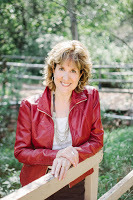 Award-winning author Beth K. Vogt believes God’s best often waits behind the doors marked “Never.” Having authored nine contemporary romance novels and novellas, Beth's first women's fiction novel with Tyndale House Publishers, Things I Never Told You, released May 2018. Moments We Forget, book two in the Thatcher Sisters Series, releases May 2019. An established magazine writer and former editor of the leadership magazine for MOPS International, Beth blogs for Novel Rocket and The Write Conversation and also enjoys speaking to writers group and mentoring other writers. Visit Beth at bethvogt.com.
Award-winning author Beth K. Vogt believes God’s best often waits behind the doors marked “Never.” Having authored nine contemporary romance novels and novellas, Beth's first women's fiction novel with Tyndale House Publishers, Things I Never Told You, released May 2018. Moments We Forget, book two in the Thatcher Sisters Series, releases May 2019. An established magazine writer and former editor of the leadership magazine for MOPS International, Beth blogs for Novel Rocket and The Write Conversation and also enjoys speaking to writers group and mentoring other writers. Visit Beth at bethvogt.com.
Published on January 10, 2020 22:00



